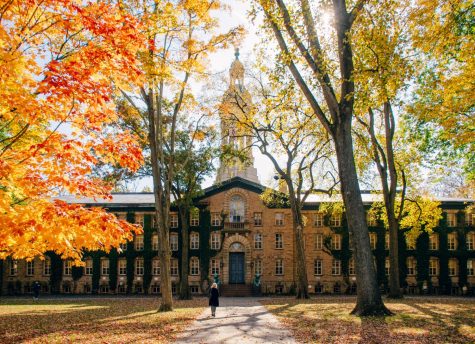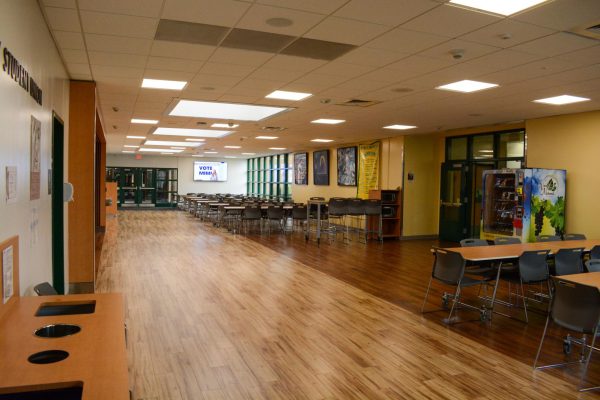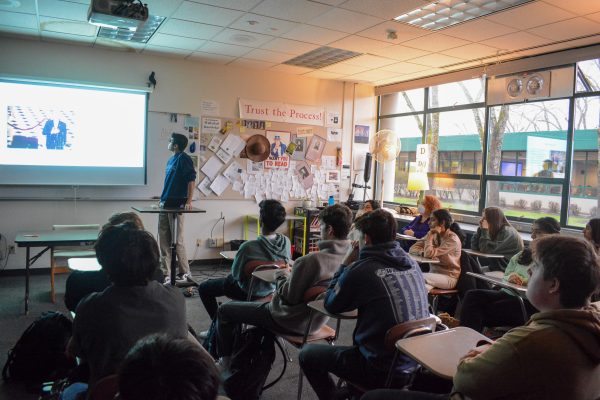Opinion: We Need to Stop Overvaluing “Prestigious” Schools

With the May 1st National College Decision Day right around the corner, many Jesuit seniors remain preoccupied with deciding where to attend college. While a student’s ultimate goal is to pick the college that will best prepare them for life after graduation, the prestige and selectivity of a school can be an increasingly alluring factor.
The increased value placed on a school’s selectivity comes as many school’s selectivity is rising. According to PewResearch, the percentage of colleges with admittance rates below 10% have increased from .4% of total US colleges in 2002 to 1.2% in 2017. Additionally, admission rates have dropped by an average of at least 10% since 2017 in 45% of the schools in PewResearch’s study.
As a result of increasing selective acceptance rates, some selective institutions, such as Stanford, Princeton, Penn, and Cornell, have decided to no longer release their acceptance rates. This decision seems to come as a response to the increased anxiety felt by many high school students and their parents as a result of narrowing acceptance rates.
“I know some of my friends had parents who wanted them to apply to 20 or more schools,” senior Suzanne Navarro said. “They then had to finish these applications while keeping up with their hard classes, which was hard to watch.”
The concern caused by these dropping admissions rates further reflects the values they illuminate, with rising beliefs that the selectivity of a school directly determines its value to individuals and that schools that are not selective are not going to provide a good education. For individuals who cannot get into selective schools or cannot afford them, they may feel pessimistic about their future at a public university or less selective private institutions.
SELF-PROMOTING COLLEGE DECISIONS INCREASES PRESSURE
Part of the drive to place a higher value on a school’s prestige comes from an increase of pressure through social media. Promoting one’s college decision has become an increasingly popular practice, from wearing college sweatshirts on National College Decision Day, to posting where students will be attending on Jesuit’s senior class of 2022 Instagram account.
While these practices can be important in promoting community and celebrating seniors’ accomplishments, they can also be toxic, leading some students to compare their accomplishments to those of their peers and feel inferior if they feel as though their accomplishments do not match up.
“A few of my friends have gotten Instagram or redownloaded Instagram just to post where they will be attending onto the [Jesuit senior] account and see who comments and likes it, even though they previously deleted Instagram to get away from the negative energy,” Navarro said.
Navarro further elaborates on how this type of pressure can even influence the type of schools individuals apply to and eventually decide to commit to.
“When there’s pressure to say where you’re going, I think people do tend to pick more prestigious universities that may be less financially feasible,” Navarro said.
The concern about others’ perceptions of one’s college choice goes beyond the Instagram account. In the midst of encouraging students to attend highly-ranked schools and widen their viewpoint by attending a school out of state, some students feel as though there is a negative stigma attached to public, in-state schools as a result.
Senior Aggie Alfred reflects on how the stigma she has identified has impacted her college making decision, with University of Oregon as one of her top choices.
“People might have assumptions about why I’m going to college in-state,” Alfred said. “Assumptions including: thinking that I could not get into another college or thinking that I don’t have any other options.”
Senior Alex Reynaud describes the response they received after committing to University of Oregon, noticing a similar stigma.
“While I mostly received support, I did feel the need to justify my reasoning for going there, which was unfortunate,” Reynaud said.
Some identified this stigma stemming from the harmful aspects of Jesuit student culture: the expectations that Jesuit students are high-achieving, tendencies to base one’s self worth upon academic validation, and comparisons between one’s accomplishments with others’ via social media.
“Growing up, you’re told that school determines some of your self-worth,” Navarro said. “A lot of people grow up with that and internalize that which makes it hard to shake it.”
While this culture is perpetuated among Jesuit students, Reynaud notes that Jesuit faculty, counselors, and teachers are not the ones creating it, instead being supportive of all students. Still, Reynaud suggests that Jesuit faculty members could be doing more to dispel students’ unreasonably high expectations, toxic comparisons, and obsession with perfection.
“Prioritizing prestige and prioritizing being perfect is very noticeable among students,” Reynaud said. “I don’t think that the school is necessarily responsible for creating it, but they do have the responsibility to respond to it.”
Reynaud has similarly noticed a culture of Jesuit students and parents that associates one’s self worth with their success in school, creating expectations of perfection that are unrealistic for anyone, but especially unattainable for individuals with responsibilities outside of school.
“It is the norm to have a perfect GPA, tons of extra curriculars, and be involved in sports,” Reynaud said. “This type of expectation can be unrealistic for individuals with special circumstances such as caring for a family member, or coping with mental health issues. Those unrealistically high standards disproportionately impact kids who have other things going on which makes them feel invalidated. This spirit of overachieving then translates to college applications.”
MENTAL HEALTH REPERCUSSIONS
The obsession with prioritizing selective schools and panic that ensues with their decreasing rates has detrimental effects on student’s mental health. In a study conducted by the Robert Wood Johnson Foundation, “excessive pressure to excel”, as found in high achieving schools and communities, was among one of the most harmful environments for adolescent wellness due to an increase in chronic stress.
This pressure from parents and school communities, coupled with increased obsession with selective schools and lower-acceptance rates, causes many high school students to over stretch themselves, signing up for as many APs as possible, participating in sports, community service, and other extracurricular activities, all to curate the persona of a well-rounded, versatile applicant. This pressure to over exert oneself often leads to burnout, turning a hobby from a loved passion to a means-to-an end.
In a study conducted by Challenge Success, a research organization affiliated with Stanford, of 250,000 surveyed middle and high school students, 95% were sleep deprived and 77% experienced stress-related health symptoms. These symptoms were largely caused due to high workloads and anxiety about college, with ¾ of students constantly stressed by schoolwork and ⅔ often worried about getting into colleges.
Symptoms of stress and burnout are also evident at Jesuit. Reynaud notes how stress is often mistaken as a sign of hard-work and passion, something to achieve rather than something to alleviate.
“There is a tendency to be very prideful about how busy or stressed you are,” Reynaud said. “I have heard many conversations where students are talking about how late they stayed up studying for a test, comparing the times as if it were a competition. We’re in the mindset, even if it’s unhealthy, of prioritizing getting into a good school over our health.”
Adverse mental health effects for high achieving students does not end with college acceptance. Students’ mental health often plummets during college, with 47% of the 32,754 undergraduates surveyed in a study conducted by University of Michigan experiencing symptoms of depression and anxiety that makes it hard to function.
Despite having high rates of students experiencing mental health issues, Ivy League schools have been found to have academic leave policies that discriminate against students with mental illnesses, prompting the Ruderman Family Foundation, an advocacy group focused on the inclusion of individuals with disabilities, to give Ivy League schools no higher than a D+ when grading schools on their leave of absence policies, a common response to student’s mental health crises.
Even after leaving college, mental health problems still linger, in part due to poor job satisfaction among graduates from prestigious universities. A report published by labor and education professors from Penn State and a sociologist from Claremont Graduate University states, “job satisfaction decreases slightly as college selectivity moves up.” One hypothesized cause for this decreased satisfaction is that graduates from prestigious universities have higher expectations, especially when it comes to wages, and are more likely to take a well-paying but unfulfilling and unenjoyable job in order to pay off large student loan debt.
WORTH THE COST?
Poor mental health can also be attributed to the anxiety over affording the cost of college. 4-in-10 students see cost as the most important factor when making a college decision with 46% of students and parents saying that financial security was a top priority for themselves and their families, according to a study conducted by Fidelity.
Worries about the cost of college were a common concern among Reynaud as well.
“I don’t know how much I will be able to enjoy school if I’m constantly worried about money,” Reynaud said.
In order to afford increasing tuition costs, many students turn to student loans. 65% of today’s students graduate with debt, totaling approximately 1.75 trillion dollars in national debt (Education Data).
Student loan debt can have stifling effects on graduates, decreasing an individual’s likelihood of purchasing a house by 36% and worsening their credit score at a young age. Amid the rise of student loan debt, the rate of defaults has increased by 11.5%, suggesting that individuals have not seen enough of a return from their degree to pay off their loans (Scholarship America).
With these severe consequences, students must seriously determine if their student loan debt is a worthwhile investment. Costing almost double than public, in-state tuition, private schools are an even bigger investment, requiring a bigger return.
Navarro relates to this common struggle, taking college loans into account while making her college decision. Navarro knows she will need student loans for medical school, so she is even more apprehensive about accruing debt to get her undergraduate degree.
“I’m trying not to have any loans for undergrad,” Navarro said. “So, I have had to reject schools where I would need to get loans even if it is only 5-10 thousand [dollars] extra.”
Some studies do suggest that prestigious schools are worth the investment, leading to higher salaries among graduates. A study conducted by economists from the RAND Corporation and Brigham Young and Cornell universities found that alumni from selective universities earned more than 40% more than graduates from less selective public universities. However, these studies have been criticized for not accounting for varying student ability.
When student ability is taken into account, salaries were similar among graduates of public and private institutions, according to a study conducted by economists from Princeton and Andrew W. Mellon Foundation that compared the salaries of graduates from private and public universities with similar GPAs and SAT scores.
This study highlights how success post college is determined not strictly by where you go, but by what you do while you are there. Students who apply themselves in college, earn good grades, and explore research, internship, and employment opportunities will see success in their field no matter the prestige of the university they graduated from.
Return on investment is not only determined by student ability, but also by the student’s major and eventual career field.
Thirdway, a national think tank, found that while ⅔ of the graduates in their study recovered costs of college within ten years of graduating, graduates in fields such as engineering, nursing, and healthcare services, saw more immediate and consistent return on investments than art, religion, and humanities majors, mainly because engineering and healthcare jobs pay more out of college and have a steady demand.
Third Way also reported that of graduates from public universities, 73% were able to recoup the cost of college within 10 years, a significant increase from the 56% of graduates of private universities.
No matter the impact of prestigious universities or type of major on later wages, trends show that graduate school plays a higher role in determining one’s wages than a bachelor’s degree will. According to the U.S Bureau of Labor Statistics, the median wage for full-time workers with a master’s degree was 12,000 dollars more per year than workers with only a bachelor’s.
The prestige of an undergraduate degree might not even be that crucial to getting graduate school acceptance, as college affiliation in undergraduate school is often not the biggest concern for graduate admissions officers, according to Erin Shelly, a former director of admissions at Johns Hopkins. Graduate programs look at academic potential, and often, it can be more compelling to stand out at a less prestigious university than to be lost within the pack of a prestigious one.
SHIFTING OUR MINDSET
Success in college is largely determined by attending the university that will best suit the student’s needs, aspirations, temperament, and learning style. For a shy, apprehensive student, attending a smaller, liberal-arts university may be more beneficial to their learning than attending a large, highly acclaimed university. In a larger, prestigious university, students must be competitive, vying against their similarly qualified peers for internships, research opportunities, and attention from professors who are often busy with their own research. If a student does not possess self-advocacy skills, they might get overlooked in this type of competitive environment, even if they are extremely bright and talented.
Different schools benefit different types of students with different learning styles. Finding the school that will be the best fit for an individual is a complex process that has less to do with the “prestige” factor and more with what environment is most conducive to the needs of the student and the student’s goals.
For some students, a prestigious university is that perfect fit. However, for many others, they feel pressured to see the prestige, selectivity, and rankings of a school as the single most important factor, overlooking the costs that prestige brings. If that prestigious university is not truly the best fit, the cost will simply not be worth it.
In order to alleviate the pressure felt by students to sacrifice finances, mental health, and learning preferences to get a degree from a prestigious school, Jesuit must help students shift their thinking.
By fostering discussions in health classes and assemblies that address the high stress and pressure placed on students, Jesuit teachers and administrators can help students identify biases towards universities with lower selectivity and dispel unrealistic expectations of perfection.
While Jesuit can help students identify their biased thinking, the responsibility to adjust our tendency to pride ourselves on perfection and prestige stands largely with students and parents. Students must resist the urge to over burden themselves with college applications or to compare their achievements with others’. Instead, they should go to the college that best suits their needs, without over inflating the value of a college’s selectivity or prestige. Additionally, students should be more conscious of biases they have towards public or in-state school. If you hear someone stating that they are attending college in-state, be aware of any assumptions that come to mind and recognize that the selectivity of a school does not determine the intelligence or worth of the individual.
Alfred says that widening our perception of a “respectable” college could also alleviate some of this pressure to overachieve and meet unrealistic expectations.
“When I heard someone telling their classmate where they’re going to college, I heard the classmate reply, ‘that’s a respectable college’, and I wondered ‘what’s a respectable college?’” Alfred said. “Getting into college itself is a respectable thing.”
Viewing college acceptance—college acceptance from any school—as a great accomplishment will not only better celebrate students for their achievements, but also help to dispel unrealistic and unattainable expectations. Widening our perception of “prestigious” universities beyond the most selective and expensive schools will ensure that students choose the school that will best prepare them for a successful and fulfilling adult life, not just the school with the shiniest name.








